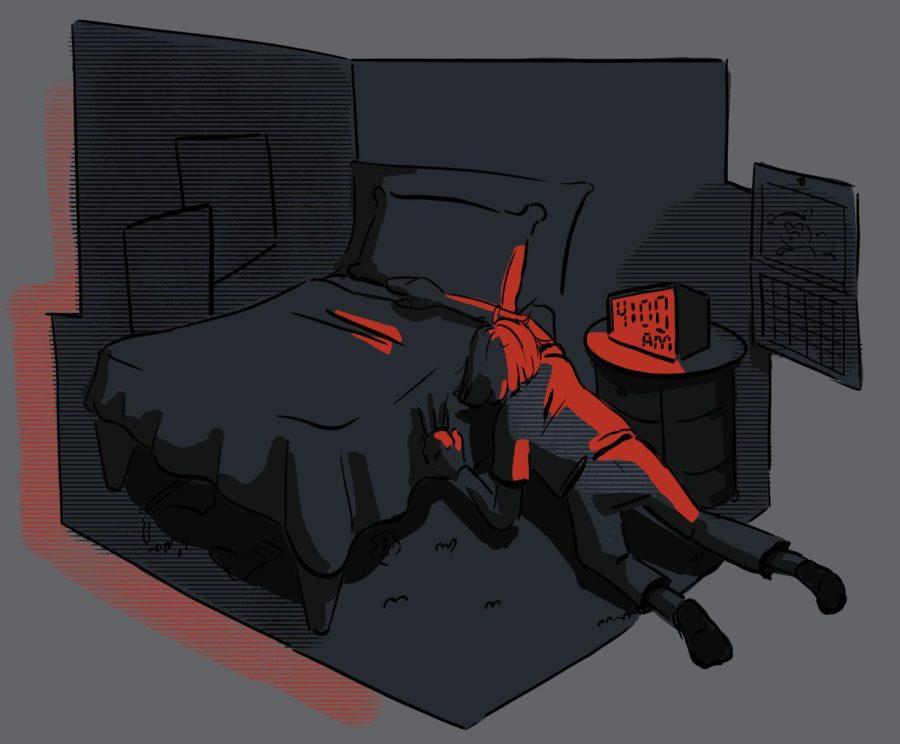Students, UT counseling staff reflect on ways academic stress can play out in everyday life
February 25, 2022
Editor’s Note: This article first appeared in the Feb. 21, 2022 in the flipbook.
Fumbling at soft fabric with caffeine-shaky hands, Danny Nguyen says his nights begin once he pulls the makeshift curtain under his bed closed, drapes his desk in shadows and hides the light of his laptop from his sleeping roommate.
Stray coffee cups, purchased in between the back-to-back classes and assignments, litter the table space. Rushing to check off every box in his planner, Nguyen said he often feels clouded by the guilt of his own expectations.
“Everyone here was top 6% or had an extremely high GPA, but I was barely top 6%. I think I was in the last spot that was accepted,” the undeclared freshman said. “I make up for not being as academically knowledgeable by doing assignments ahead of time.”
Stimulated by a caffeinated medley of coffee and energy drinks, Nguyen said he averages four hours of sleep a night and has a toxic relationship with both school and exam-induced stress. As midterm season picks up pace, students like Ngyuen must either find effective ways to balance their workload with their mental health or suffer the consequences of fatigue and burnout.
“I don’t feel the need to express my feelings to other people,” Nguyen said. “Every once in a while, I’ll have a breakdown moment for a good minute (where I’m) crying with loud metal music playing in the background, and then I restart the bottling process.”
Surrounded by the intense academic culture at UT, psychology freshman Isabella Jasso said she often gets overwhelmed with the need to push her body and mind for the sake of a grade.
“My body doesn’t want to sleep … when I have tests coming up,” Jasso said. “It’s a vicious cycle between ‘I’m so tired; I want to go to sleep’ … and (not knowing) when to stop because I feel like if the test comes and there’s a question that I didn’t study, I’ll beat myself up for it.”
Between the stress of looming assignments and trying to maintain connected with long-distance friends and family members, Jasso said she tries to check her timetable against her boyfriend’s while he studies abroad in Rome. Though forced to adapt to calling at strange hours, Jasso and her boyfriend embrace the benefits of their time difference.
“It’s good that he goes to sleep (when I’m awake) … I try to take advantage of that time and try to get my stuff done because I don’t have the pressure of wanting to call him,” Jasso said. “It’s an effort to try and balance it all, but I think I’m doing better this semester than last.”
Katy Redd, associate director for prevention, development and media relations at UT’s Counseling and Mental Health Center, said she suggests students mitigate their stress by realizing that their peers likely experience the same frustrations. Instead of focusing on the more competitive aspects of the classroom, students can work together to destress and find community.
“It’s normal to not have everything figured out yet,” Redd said. “There’s a lot of students who are high achievers and seem to be amazing superstars. Then when you talk to them, it’s like, ‘I have the same issues. I’m just really good at putting this layer on the outside.’”
While she always recommends students consider joining groups on campus or visit university counselors, Redd said her greatest tip — especially to those facing the threat of comparison — is to simply be open to honesty and accepting support.
“One of the things that can be powerful in helping to combat those feelings (of stress) is being vulnerable and authentic with other humans,” Redd said. “Share that experience and common humanity.”



